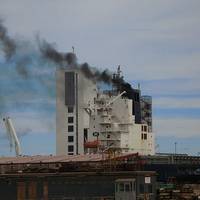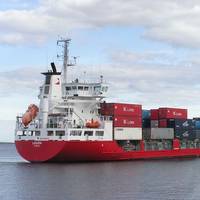MHI, Mitsubishi Kakoki Develop Hybrid SOx Scrubber
Mitsubishi Heavy Industries, Ltd. (MHI) and Mitsubishi Kakoki Kaisha, Ltd. (MKK) have jointly developed a Hybrid SOx Scrubber System that efficiently removes sulfur oxides (SOx) from exhaust gas emitted by marine diesel engines. The Hybrid SOx Scrubber System is the first in Japan to comply with the more stringent SOx emission regulations that will take effect in designated emission control areas (ECA) in 2015. The system is capable of scrubbing exhaust gas from the combustion of fuels emitted from bunker heavy fuel oil to the level combusting more costly low-sulfur fuel oil. By adopting a modular design, the system also facilitates retrofit installations on ships already in service.
Diesel Engine Hybrid SOx Scrubber Japan's First

Mitsubishi Heavy Industries, Ltd. (MHI) and Mitsubishi Kakoki Kaisha, Ltd. (MKK) say they have jointly developed a "Hybrid SOx Scrubber System" that efficiently removes sulfur oxides (SOx) from exhaust gas emitted by marine diesel engines – the first in Japan to comply with the more stringent SOx emission regulations that will take effect in designated emission control areas (ECA) in 2015. The system is capable of scrubbing exhaust gas from the combustion of fuels emitted from bunker heavy fuel oil to the level combusting more costly low-sulfur fuel oil.
Langh Ship Develops Exhaust Gas Scrubber

Although the sulphur limit for ship fuel in the North Sea and Baltic Sea is 1%, Langh Ship’s m/s Laura sails in the area with whatever fuel the charterer has found in Rotterdam, no matter how high its sulphur content. This is possible because the shipping company has equipped the vessel with a closed loop scrubber that emits exhaust gas that is even cleaner than if the fuel had a sulphur content of no more than 0.1%. Environmental regulations in this sulphur emission control area (SECA) have been tightened such that the sulphur limit for fuel will drop to 0.1% at the start of 2015.
IMO’s GloBallast Program Wins
The GEF/UNDP/IMO GloBallast Program, a project, executed by IMO which is aimed at preventing the spread of unwanted alien organisms in ballast water, has won the Institute of Marine Engineering, Science and Technology (IMarEST) Queen's Golden Jubilee Marine Environment Award. The final “heat” was held on the evening of 1 October, when the finalists made a presentation to the judging panel and a general audience at IMarEST’s London headquarters. The problem of invasive species is largely due to the expanded trade and traffic volume over the last few decades. The effects in many areas of the world have been devastating. Quantitative data show the rate of bio-invasions is continuing to increase at an alarming rate, in many cases exponentially, and new areas are being invaded all the time.
Virginia’s CIT Receives National Award
Virginia's Center for Innovative Technology (CIT) received national recognition for its assistance in the development of a ballast-water processing system designed to reduce the introduction of invasive foreign plankton transported by cargo ships. The project with Old Dominion University and Browning Transport Management was selected as "outstanding" in the technology assistance category of the National Association of Management and Technical Assistance Centers (NAMTAC) Project of the Year Awards competition. The award was presented last night at the NAMTAC 2002 Fall Awards Banquet in Asheville, NC, to Robert Harrell, CIT's vice president of regional operations. The award is CIT's 16th NAMTAC award in the past 10 years.






